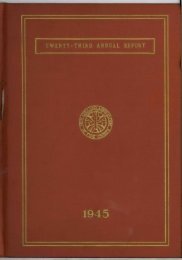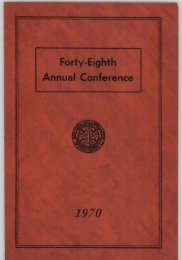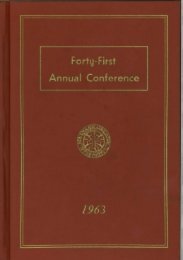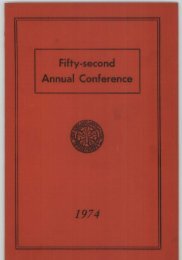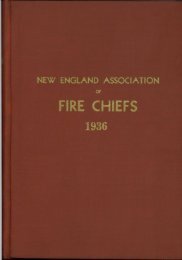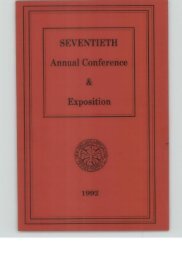NEAFC 32nd Annual Conference.pdf - New England Association of ...
NEAFC 32nd Annual Conference.pdf - New England Association of ...
NEAFC 32nd Annual Conference.pdf - New England Association of ...
Create successful ePaper yourself
Turn your PDF publications into a flip-book with our unique Google optimized e-Paper software.
NEW ENGLAND ASSOCIATION OF FII~ CHIEFS<br />
do not approach the cylinders; leave them alone, because at any moment, the<br />
release valve may let go, and that presents quite a stream <strong>of</strong> fire. It is probably<br />
a ~ 12-foot rush <strong>of</strong> flame, burning perhaps 4 feet <strong>of</strong>f the nozzle, and is usually<br />
directed away from the center o~ c the installation, parallel to the building,<br />
because that is the way the cylinders, are set in.<br />
So that if you have any doubt about whether or not the cylinders have<br />
been warmed up at all, leave them alone. Do not play water on the cylinders,<br />
because by doing so, you may keep a fusible plug from operating correctly.<br />
Now, it is true that if you can be sure the cylinders have a spring-loaded<br />
release, a stream <strong>of</strong> water would be indicated to keep the cylinders, cool and<br />
from. building ’pressure.<br />
But, you may have a cylinder with only a fusible plug, and if you_do<br />
play water on. it, it is conceivable that pressure could build up, and you<br />
would have an excessive pressure condition in the cylinder.<br />
Another point is that you are tying up a loss that could be used on combustibles.<br />
So we believe that the cylinder should not be wet down and kept cool,<br />
but should be left alone. You know, better than I do, that if you play .water<br />
on the combustible, even in the presence <strong>of</strong> intense fire, you can keep the<br />
combus.tible from catching, and you won’t have a problem for over a few<br />
minutes in the cylinder, because in elevated temperatures, and so forth, they<br />
will discharge themselves very rapidly.<br />
I had occasion to see a couple <strong>of</strong> cylinders go, a while back, and I don’t<br />
think it was over three .minutes, intermittently, that they were completely<br />
empty, and they were no longer a problem to the fire, and they controlled<br />
the combustibles within the area.<br />
That is probably your greatest incidence <strong>of</strong> LP, as concerned with fires.<br />
It is conceivable that if you have a bulk plant in your area, sometime you<br />
might be called upon to attend a call at that particular station. It is certainly<br />
something that yoti should be aware <strong>of</strong>, and have studied and gone over the<br />
flo.w diagram <strong>of</strong> the bulk plant, width the Manager.<br />
Briefly, a bulk plant consists <strong>of</strong> a tank car unloading station, a compressor<br />
for transferring the liquid, a large storage tank, pumping facilities., and a<br />
building used for marilfolding and filling <strong>of</strong> cylinders, by the pump.<br />
There is a great deal <strong>of</strong> piping, a great deal <strong>of</strong> valving. And~ familiarity<br />
with the valves, <strong>of</strong> course, is the No. 1 weapon, I should say, in combating a<br />
bulk plant fire. Secondly, the storage tanks should be kept cool. They have<br />
spring-loaded release only, so that you are not getting into di~culty in so far<br />
as fusable plugs are concerned. You have contained there a great deal more<br />
fuel, and by designating, a couple <strong>of</strong> hose lines, you can keep 10,000, 15,000<br />
or 20,000 gallons <strong>of</strong> propane cool, so that you will not further involve the<br />
fire. That hasbeen proven; that has. been .done a certain number <strong>of</strong> times.<br />
There is one thing that I should like to impress upon you very strongly, and<br />
it is this. Do not extinguish a propane fire, unless by s 9 doing, you can shut<br />
<strong>of</strong>f the source <strong>of</strong> the fuel. I think that you can all appreciate the hazard <strong>of</strong> an<br />
accumulation <strong>of</strong> unburned: ga s, as compared with burning fuel. It is a great<br />
deal more ext_re_me .to have an area loaded with a mixture <strong>of</strong> fuel and gas,. ~han.<br />
57



